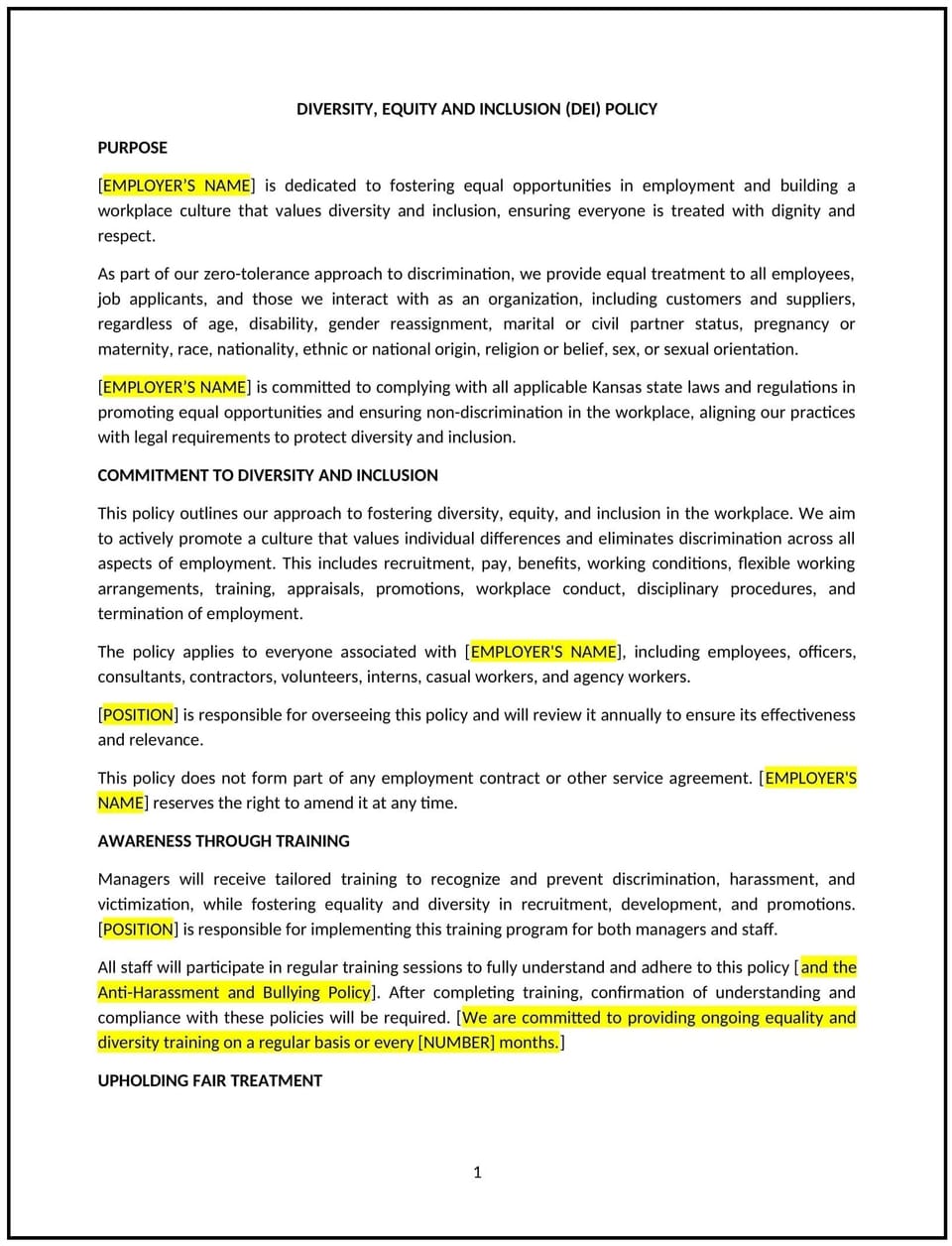Diversity, equity, and inclusion (DEI) policy (Kansas): Free template

Diversity, equity, and inclusion (DEI) policy (Kansas)
A diversity, equity, and inclusion (DEI) policy helps Kansas businesses foster a workplace culture that values and respects the differences and perspectives of all employees. This policy outlines the principles, practices, and actions the business will take to promote diversity, create an equitable work environment, and ensure inclusivity in all aspects of the organization.
By implementing this policy, businesses can improve employee satisfaction, encourage innovation, and build a more welcoming and collaborative work environment.
How to use this diversity, equity, and inclusion (DEI) policy (Kansas)
- Define diversity, equity, and inclusion: Businesses should clearly define what diversity, equity, and inclusion mean within the context of their workplace, including respect for all backgrounds, cultures, and perspectives.
- Set DEI goals: Businesses should establish measurable goals related to diversity in hiring, promotions, pay equity, and employee representation across all levels.
- Create inclusive hiring practices: Businesses should ensure recruitment efforts reach diverse candidate pools and eliminate biases in the hiring process.
- Provide training and education: Businesses should offer regular DEI training to employees and managers to raise awareness and promote understanding of diverse backgrounds and perspectives.
- Establish accountability mechanisms: Businesses should implement systems for tracking DEI progress, conducting employee surveys, and holding leaders accountable for fostering an inclusive culture.
- Support employee resource groups: Businesses should encourage the formation of groups or committees that promote DEI within the workplace, providing support and resources for their success.
- Review and update regularly: Businesses should assess DEI initiatives periodically to ensure they align with company values and are effectively contributing to a more inclusive workplace.
Benefits of using a diversity, equity, and inclusion (DEI) policy (Kansas)
- Improves workplace culture: Promotes respect and understanding among employees, leading to a more supportive and collaborative environment.
- Enhances employee engagement and retention: Employees are more likely to feel valued and stay with the company when diversity and inclusion are prioritized.
- Drives innovation and creativity: A diverse workforce brings varied perspectives that can contribute to new ideas, solutions, and innovation.
- Strengthens reputation: Businesses known for their commitment to DEI are more likely to attract top talent and gain positive recognition from customers and partners.
- Promotes fairness and equality: Creates a level playing field for all employees, ensuring equal opportunities for career advancement, compensation, and recognition.
- Reduces discrimination and harassment: By fostering a culture of inclusion and respect, businesses can reduce incidents of discrimination, bias, and harassment.
Tips for using this diversity, equity, and inclusion (DEI) policy (Kansas)
- Communicate DEI goals clearly: Businesses should share their DEI policy and progress with all employees to ensure transparency and collective commitment.
- Provide leadership support: Business leaders should demonstrate their commitment to DEI by championing initiatives and holding themselves accountable.
- Foster open dialogue: Encourage employees to share their perspectives and experiences related to DEI, creating an open space for honest conversations.
- Measure DEI success: Track key metrics such as employee demographics, retention rates, and satisfaction scores to assess DEI progress.
- Support continuous education: Offer ongoing DEI training and resources to help employees understand and appreciate diverse perspectives.
- Address challenges proactively: When issues arise, businesses should address them openly and fairly, ensuring that all employees are treated with dignity and respect.
Q: Why should Kansas businesses implement a diversity, equity, and inclusion (DEI) policy?
A: Businesses should implement a DEI policy to create a fair, inclusive workplace that values diversity and provides equal opportunities for all employees, which can enhance productivity, employee satisfaction, and organizational success.
Q: What types of DEI goals should businesses set?
A: Businesses should set goals related to diverse hiring practices, pay equity, employee retention, representation in leadership, and fostering a culture of respect and inclusivity across the workplace.
Q: How can businesses ensure inclusivity in their hiring practices?
A: Businesses should implement strategies such as using diverse recruitment channels, minimizing unconscious bias in the interview process, and setting inclusive job descriptions that encourage a variety of applicants.
Q: How should businesses address DEI challenges that arise in the workplace?
A: Businesses should address challenges openly and fairly by creating opportunities for dialogue, offering conflict resolution resources, and taking immediate action to address discrimination or exclusion.
Q: What role does leadership play in promoting DEI?
A: Leadership should set the tone for DEI by championing initiatives, allocating resources to DEI programs, and holding themselves and the organization accountable for creating a more inclusive culture.
Q: How often should businesses review and update their DEI policy?
A: Businesses should review their DEI policy annually or when significant workplace changes occur, such as hiring practices, employee feedback, or shifts in legal or regulatory requirements.
This article contains general legal information and does not contain legal advice. Cobrief is not a law firm or a substitute for an attorney or law firm. The law is complex and changes often. For legal advice, please ask a lawyer.


